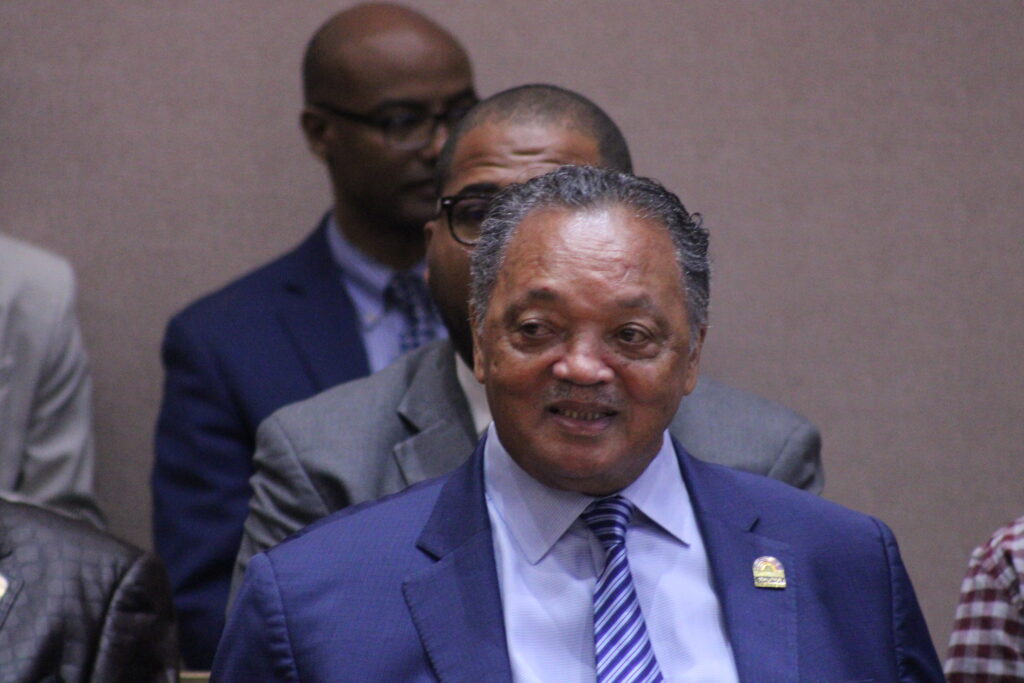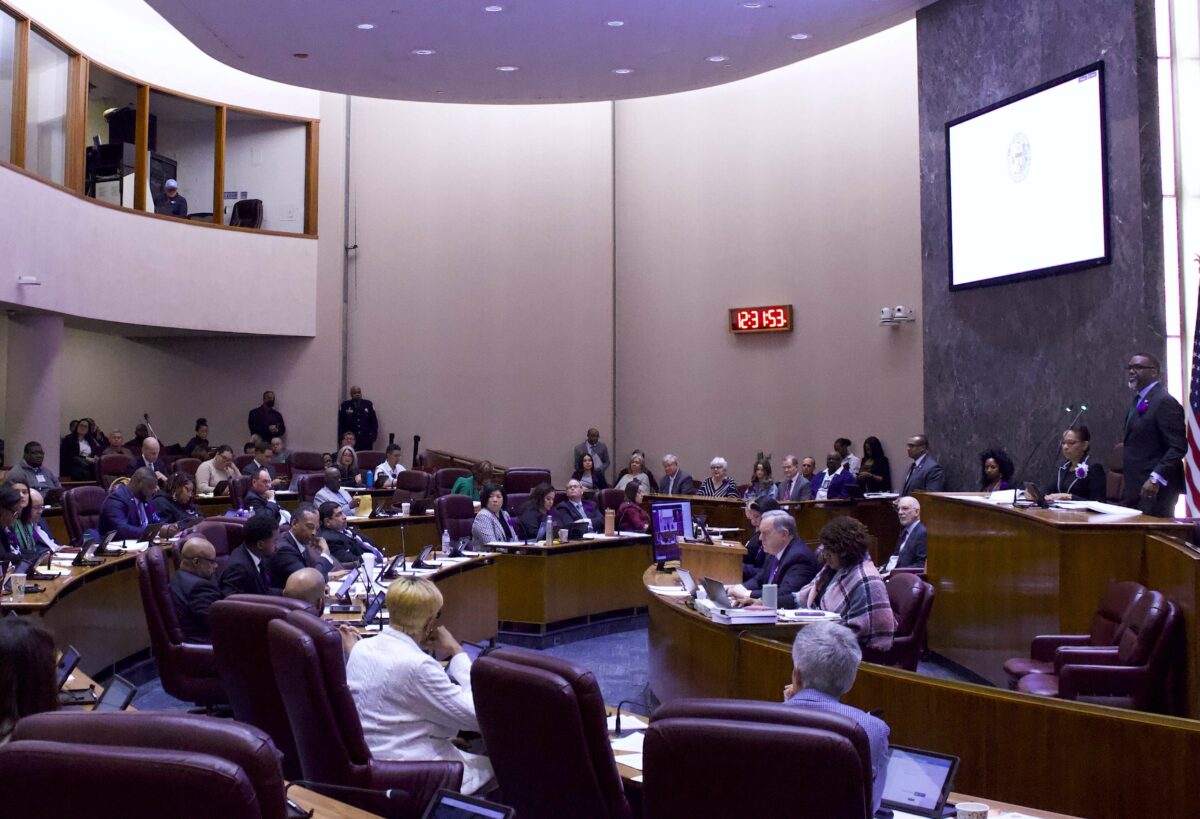On Thursday, the City Council moved forward on ordinances long sought after by progressive organizers, including measures that would create a real estate transfer tax to fund anti-homelessness efforts, a youth-led violence prevention program, and a housing preservation plan designed to protect renters and homeowners in South Shore.
The measures have been goals of organizers for years, and some, such as the real-estate transfer tax, would keep campaign promises made by Mayor Brandon Johnson if passed. That ordinance, called “Bring Chicago Home” by its backers, would increase the tax on real estate sales of more than $1 million to create a dedicated funding stream for homelessness alleviation and prevention.
Last year, Bring Chicago Home stalled in the City Council after then-Mayor Lori Lightfoot, who had included it in her 2019 campaign platform, withdrew her support. That version of the ordinance would have created a flat tax on all real estate sales above $1 million. Johnson’s proposal will be graduated for sales above $1 million, and reduce the tax on property sales below that. The ordinance Johnson and his City Council allies introduced today would put a referendum on the March 2024 ballot for voters to decide the fate of the tax.
Ald. Desmon Yancy (5th Ward) and Jeanette Taylor (20th Ward) announced the South Shore Housing Preservation Ordinance at a press conference before the council meeting, where it was later introduced. The ordinance was championed by the South Shore Community Benefits Agreement (CBA) Coalition, which formed in 2016 when the Obama Center construction was announced. In the February municipal election, South Shore residents overwhelmingly supported two advisory referendums calling for a CBA in South Shore and more affordable housing in Woodlawn.
If passed, the Housing Preservation Ordinance would require 60 percent of new developments be reserved for households that earn less than 30 percent of the city’s median income, or roughly $20,000, and reserve all vacant lots in South Shore owned by the City, as well as a lot at 63rd and Blackstone Avenue in Woodlawn, for affordable housing developments. It would also ban move-in fees and cap application fees and security deposits for renters.
In an amendment that drew an attempt at parliamentary maneuvering from Ald. Raymond Lopez (15th Ward), the City Council also voted to accept $33 million in federal funds to underwrite support for asylum seekers. Lopez, who referred to the measure as “a turd” wrapped in “bacon” on the Council floor, tried unsuccessfully to carve the $33 million out for separate consideration from the rest of the funding in the amendment, which was allocated for homelessness and the CPD, but was voted down. The council then passed the entire amendment, with “no” votes from Lopez, Desmon Yancy (5th Ward), Anthony Beale (9th Ward), and James Gardiner (45th Ward). In a separate measure, the council approved a plan for the City to purchase a North Side building from the Metropolitan Water Reclamation District and convert it into a shelter for asylum seekers.
A proposal that would eliminate the minimum wage for tipped workers and another that would introduce the Peace Book Ordinance, a violence prevention plan long championed by GoodKids MadCity, were both sent to the Rules Committee.

Alderperson Rossana Rodriguez-Sanchez (33rd Ward) introduced an ordinance that would create a working group to plan the expansion of public mental health clinics.
The council also approved City settlements that collectively totaled millions of dollars. The largest was for $25 million that the City will pay to two men who were wrongfully convicted of a 1993 murder and spent decades in prison before being exonerated. Alderpersons Brian Hopkins (2nd Ward), Marty Quinn (13th Ward), Silvana Tabares (23rd Ward), Bill Conway (34th Ward), Anthony Napolitano (41st Ward), and Brendan Reilly (42nd Ward) voted against the settlement.
During the nearly five-hour meeting, the council also passed resolutions honoring Rev. Jesse Jackson Sr., Hispanic Heritage month, and a Lincoln Park restaurant. Jackson, a longtime civil rights leader, ran Operation PUSH at 930 E. 50th Street for decades before his retirement earlier this year. He became the first Black man to run for president in 1984, and ran again in 1988. Jackson was lauded by multiple alderpersons and received a standing ovation at the meeting.

The council approved the mayor’s nomination of Chasse Rehwinkel as the City’s comptroller. Alderpersons Greg Mitchell (7th Ward), Marty Quinn (13th Ward), Raymond Lopez (15th Ward), Silvana Tabares (23rd Ward) and Jason Ervin (28th Ward) voted against his appointment. The council also approved Angela Tovar as the City’s chief sustainability officer, where she will be tasked with advancing a climate and environmental sustainability agenda.
At a press conference after the meeting, Mayor Johnson called Bring Chicago Home “a crucial step for eradicating homelessness” for Chicago residents.
“This is very, very much personal for all of us here today,” said Johnson, whose older brother died while experiencing homelessness some years ago. “And so the time to act is now.”
Correction: This article originally stated the City Council meeting took place on Wednesday. It was held Thursday, Sept. 14. We regret the error.
Jim Daley is a senior editor at the Weekly.


A very powerful article. Great work Jim Daley.
Well written. Informative and enlightening. Thanks